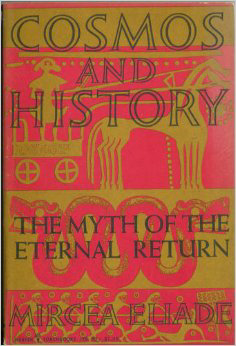Part of the Casswiki article series Books

Cosmos and History: The Myth of the Eternal Return is a work of the history of religions by Mircea Eliade, first published in 1954. It consists of four chapters with a foreword.
In this book, the author points to his analysis that a traditional man attributes no value to the linear perspective of historical events: only the events of the mythical age have value. Presumingly, that is where the essence of the Sacred lies. The author also brings the reader to the understanding of the “Eternal Return” - a belief in the ability to return to the mythical age, to “become” contemporary with the events described in one’s myth. The “cyclical” time is attributed to this belief.
However, this “yearning” to return to the mythical age causes a “terror of history”.
As Laura Knight-Jadczyk writes in fifty-second chapter of her [[The Wave Series|The Wave Series]]:[1]
As the great Historian of Religion, Mircea Eliade pointed out, the study of history, through its various disciplines, offers a view of mankind that is almost insupportable. The rapacious movements of hungry tribes, invading, conquering and destroying in the darkness of prehistory; the barbarian invaders of the civilized world during medieval times; the bloodbaths of the crusades of Catholic Europe against the infidels of the Middle East; the stalking noonday terror of the Inquisition where martyrs quenched the flames with their blood; and the raging holocaust of modern genocide. Wars, famine, pestilence; all produce an intolerable sense of indefensibility against what Mircea Eliade calls the Terror of History.
As I have written elsewhere, when man contemplates history, as it is, he is forced to realize that he is in the iron grip of an existence that seems to have no real care or concern for his pain and suffering. Over and over again, the same sufferings fall upon mankind multiplied millions upon millions of times over millennia. The totality of human suffering is a dreadful thing. I could write until the end of the world using oceans of ink and forests of paper, and never fully convey this terrible condition in which mankind finds his existence.
The beast of arbitrary calamity has always been with us. For as long as human hearts have pumped hot blood through their too-fragile bodies and glowed with the inexpressible sweetness of life and yearning for all that is good and right and loving, the sneering, stalking, drooling and scheming beast of real life has licked its lips in anticipation of its next feast of terror and suffering. Since the beginning of time, this mystery of the estate of man, this Curse of Cain has existed. And, since the Ancient of Days, the cry has been: “My punishment is greater than I can bear!” But if you find yourself saying this, you are “alienated,” antisocial, and incapable of finding any meaning in life. You are just simply not with the program…
